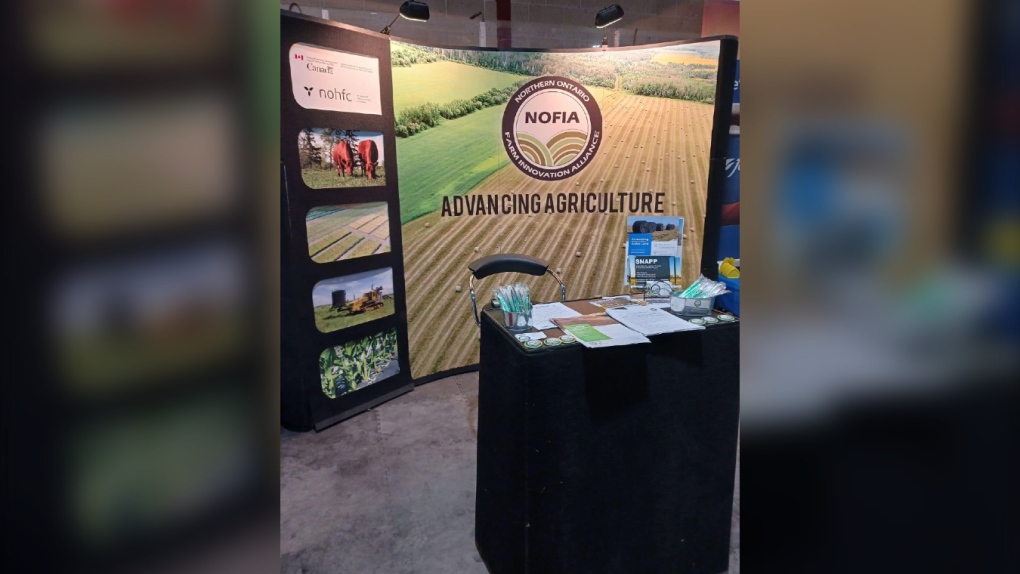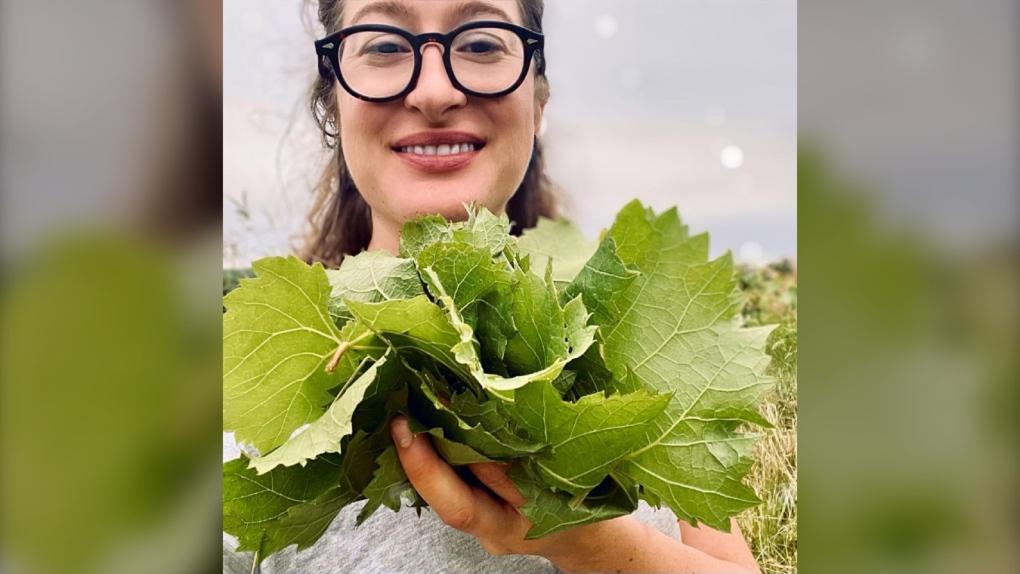Co-ordination key to northern Ont. food security: report
A new report suggests that greater partnerships across northern Ontario can help boost local food security in the region and encourage production of “food for the north in the north.”
 An information booth setup for the Northern Ontario Farm Innovation Alliance at Earlton Farm Show in April 2024. (Northern Ontario Farm Innovation Alliance/Facebook)
An information booth setup for the Northern Ontario Farm Innovation Alliance at Earlton Farm Show in April 2024. (Northern Ontario Farm Innovation Alliance/Facebook)
Local food procurement in northern Ontario is challenged by distance and low population density.
The report by the Northern Ontario Farm Innovation Alliance, found a need for connections that can bring people and businesses together and coordinate farmers and hubs to assemble and transport goods in a better way.
Northern Ontario Farm Innovation Alliance is a non-profit organization dedicated to developing strategies and partnerships to ensure the advancement of agricultural research and innovation in northern Ontario based in Temiskaming Shores, Ont.
“Current organizations are at capacity,” said the alliance in a news release on Monday.
“The region needs a champion who will be able to lead these efforts.”
Genevieve Sartor, the lead author of the report, is a local food consultant, a business owner and a chef on Manitoulin Island.
 Genevieve Sartor is a local food consultant, a business owner and a chef on Manitoulin Island. She is the lead author on a new report by the Northern Ontario Farm Innovation Alliance suggesting that greater partnerships across northern Ontario can help boost local food security in the region and encourage production of 'food for the north in the north.' (Facebook/New Grain Kitchen)
Genevieve Sartor is a local food consultant, a business owner and a chef on Manitoulin Island. She is the lead author on a new report by the Northern Ontario Farm Innovation Alliance suggesting that greater partnerships across northern Ontario can help boost local food security in the region and encourage production of 'food for the north in the north.' (Facebook/New Grain Kitchen)
“We have unique products to offer in northern Ontario and it’s easy to find farmers who want to supply local food and institutions who want buy those products, but the how is where it becomes difficult,” she said in the news release.
“We face challenges of cost, processing and proximity to food hubs.”
Sartor said the report is an extensive exploration of the issue that looked to identify how to move forward with practical solutions.
“How can we, for example, chain together links from Thunder Bay to Manitoulin, for example to drive down costs? Is that through a series of transfer stations, for example,” she said.
“That’s what we need to see happen – coordination and having the initiative to coordinate.”
According to the innovation alliance’s project development advisor Leia Weaver, one project the organization proposes as a recommended outcome is the development of an easy-to-use northern Ontario food website to identify who is producing what and where.
 Leia Weaver, the Northern Ontario Farm Innovation Alliance's project development advisor. (LinkedIn)
Leia Weaver, the Northern Ontario Farm Innovation Alliance's project development advisor. (LinkedIn)
Such a site would allow farmers and businesses to easily come together and be able to supply institutions in the north directly with the goal being to simplify local food procurement and support businesses in transporting goods more collaboratively and efficiently in order to bring down transportation costs.
“A lot of this project has to do with value chain coordination and joining farmers together across the north to increase the use of northern food for northern institutions,” said Weaver.
“There is no one size fits all, but we can harness what we have in common and try to leverage that to allow further scale-up so farmers can access those larger institutional contracts.”
Weaver said the report dove deeply into the challenges and opportunities of the local food system and worked on identifying benefits for northern Ontario agriculture and food as much of the information available around food value chains focused on examples from southern Ontario or the United States.
“What we do in the north is determined by our geography and recognizing how different areas of the north are is important,” she said.
According to Weaver, additional funding allowed the research to be more diverse and focused, giving the team time for in-depth study and gaining information from on-the-ground stakeholders on what is challenging them and how different initiatives might help.
The research behind the report was supported with partnerships with the Ontario Ministry of Agriculture, Food and Agribusiness and the Natural Sciences and Engineering Research Council with additional funding supplied by the Supply Chain Stability and Adaptability Program to develop the final report and recommendations.
For more information on the Northern Ontario Farm Innovation Alliance and their project, visit their website or find them on social media.
CTVNews.ca Top Stories

From essential goods to common stocking stuffers, Trudeau offering Canadians temporary tax relief
Canadians will soon receive a temporary tax break on several items, along with a one-time $250 rebate, Prime Minister Justin Trudeau announced Thursday.
'It didn't sound good': Mother shares what her sons went through with walking pneumonia
A mother shares with CTVNews.ca her family's health scare as medical experts say cases of the disease and other respiratory illnesses have surged, filling up emergency departments nationwide.
Putin says Russia attacked Ukraine with a new missile that he claims the West can't stop
Russian President Vladimir Putin announced Thursday that Moscow has tested a new intermediate-range missile in a strike on Ukraine, and he warned that it could use the weapon against countries that have allowed Kyiv to use their missiles to strike Russia.
Manitoba RCMP issue Canada-wide warrant for Ontario semi-driver charged in deadly crash
Manitoba RCMP have issued a Canada-wide arrest warrant for the semi-driver involved in a crash that killed an eight-year-old girl and her mother.
Here's a list of items that will be GST/HST-free over the holidays
Canadians won’t have to pay GST on a selection of items this holiday season, the prime minister vowed on Thursday.
Mother charged after infant dies in midtown Toronto: police
The mother of an infant who died after being found at an apartment building in midtown Toronto on Wednesday has been charged with failing to provide the necessaries of life.
Tired, lead-footed and distracted: Majority of Canadian drivers admit to bad habits, survey finds
Canadian drivers are regularly in a hurry to get to their destination and a majority are willing to take unnecessary risks on the road, according to the results of a new survey.
Brazilian police indict former president Bolsonaro and aides in alleged 2022 coup attempt
Brazil's federal police said Thursday they indicted former President Jair Bolsonaro and 36 other people on charges of attempting a coup to keep him in office after his electoral defeat in the 2022 elections.
Matt Gaetz drops bid for Trump attorney general in face of U.S. Senate opposition
Hardline Republican Matt Gaetz withdrew his name from consideration as U.S. president-elect Donald Trump's attorney general, in the face of opposition from the Senate Republicans whose support he would have needed to win the job.
































